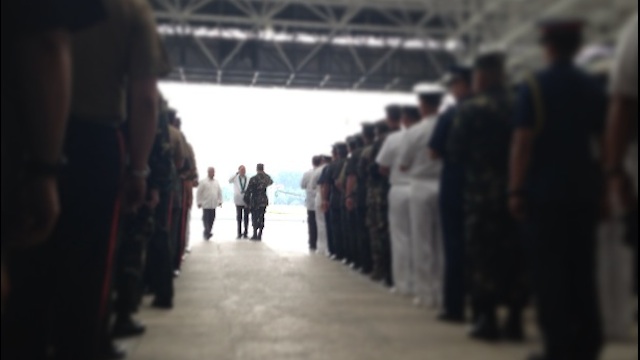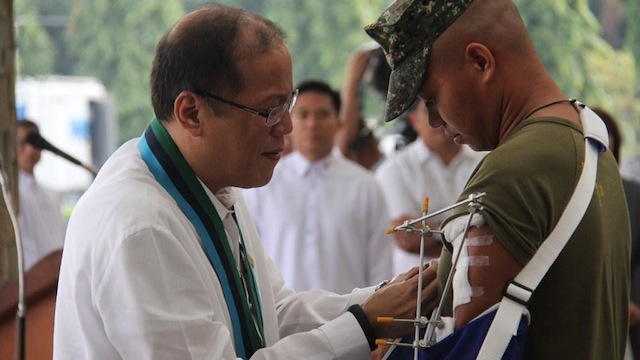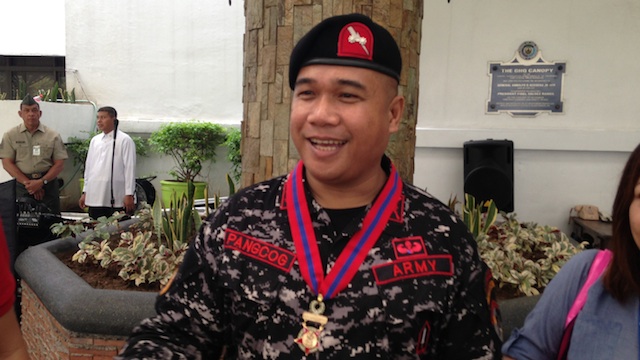
HEROES OF ZAMBOANGA: President Benigno Aquino III leads awarding ceremonies for 12 officers and 6 enlisted personnel
The
But along with the honor, high-ranking generals and enlisted personnel bring with them lessons they learned from the urban warfare the Armed Forces is not used to.
"It's the first time we got a military operation in an urban terrain. The situation wherein even our capabilities were tested. Have you seen Black Hawk Down? It was like that," said Lieutenant General Rey Ardo, outgoing chief of the Western Mindanao Command (Wesmincom). He was referring to the American film on the Battle of Mogadishu in
Westmincom supervises the volatile area of
"We have to look into our joint operations. We have to look into the capability of fighting in urban terrain, more on equipage, more on personnel training," said Ardo.
Ardo received the Distinguished Service Star, the second highest award a soldier can receive in his career.
It's the same award received by deputy chief of staff for operations Brigadier General Rodelio Santos and AFP public affairs office chief Lieutenant Colonel Ramon Zagala.
The award recognizes their "eminently meritorious and valuable service rendered during the Zamboanga Crisis."

WOUNDED PERSONNEL MEDAL: Marine Pfc Eduardo A. Jose. Photo from the Armed Forces of the
For Marine Pfc Eduardo Jose, the
A rebel's bullet hit his left arm and pierced through his chest and reached his lungs. It happened on the second day the military launched its calibrated response, September 14. He received the Wounded Personnel Medal.
Night-fighting equipment could have helped, he said. Because the rebels were also wearing uniforms, Jose said it was difficult to distinguish them from fellow soldiers when it got dark.
Jose is afraid he will not be able to recover his strength. "The fracture was bad. My lungs were hit. It may be difficult."
He momentarily forgot his worries when he received the award from the President no less. "High morale," he said.

DISTINGUISHED
CONDUCT STAR: Lieutenant Colonel Oriel Pangcog, battalion commander of the JSOG
Task Force Arrow
Highest honor
But the officer who
received the highest honor for combat was given to Lieutenant Colonel Oriel
Pangcog, battalion commander of Joint Special Operations Task Force Group
Arrow.
He led 250 Scout Rangers, who were among those who engaged Misuari's trusted commander Habier Malik and his men in a close-quarter combat. He received the Distinguished Conduct Star award.
The first days of the assault were the most difficult, he said. "At that time, we didn't know what was inside the battle zone. We had to adjust. Eventually, we were able to get the hang of it."
The standoff dragged for 3 weeks because they had to make sure the hostages were not caught in the line of fire. "If it happened in the mountains, we could launch canons or use airplanes and mortars. We could have ended it immediately. But we were very deliberate as we combed the houses. It got more difficult as we approached the shanties," Pangcog said.
"The President said our paramount concern is the lives of the hostages. We could have ended it immediately – launch an assault and destory everything. But all the hostages would die," he said.
The Scout Rangers were among the AFP's elite troops. But Pangcog admitted they were all scared, too. "Takot din. Lahat takot. Ang mga sundalo ko nakita ko takot, kaya sabi ko, relax lang. (We were scared, too. My soldiers were scared, so I told them to relax.)
"I tried not to think about it. We just took it day by day. We tried to accomplish our objective every day," he added.
Death of comrades is always the most difficult. The Rangers lost 3 colleagues. Another 40 were hospitalized because of various injuries.
He recalled a day when "20 plus" soldiers were hurt because the rebels were waiting for them at the end of the alley.
While he was satisfied with the performance of his team, he acknowledged that more training would help.
"For the rangers, we need more training for urban areas likeZamboanga City
"We can benefit from more training, force protection equipment, and clearing operations," he added.
There's no dearth of stories on heroism in the operations that involved over nearly 3,000 soldiers. AFP Chief of Staff General Emmanuel Bautista said they are screening possible recipients of the medal of valor, the highest combat recognition a soldier can receive.
Theirs will be the best stories soldiers will bring home from the crisis.
He led 250 Scout Rangers, who were among those who engaged Misuari's trusted commander Habier Malik and his men in a close-quarter combat. He received the Distinguished Conduct Star award.
The first days of the assault were the most difficult, he said. "At that time, we didn't know what was inside the battle zone. We had to adjust. Eventually, we were able to get the hang of it."
The standoff dragged for 3 weeks because they had to make sure the hostages were not caught in the line of fire. "If it happened in the mountains, we could launch canons or use airplanes and mortars. We could have ended it immediately. But we were very deliberate as we combed the houses. It got more difficult as we approached the shanties," Pangcog said.
"The President said our paramount concern is the lives of the hostages. We could have ended it immediately – launch an assault and destory everything. But all the hostages would die," he said.
The Scout Rangers were among the AFP's elite troops. But Pangcog admitted they were all scared, too. "Takot din. Lahat takot. Ang mga sundalo ko nakita ko takot, kaya sabi ko, relax lang. (We were scared, too. My soldiers were scared, so I told them to relax.)
"I tried not to think about it. We just took it day by day. We tried to accomplish our objective every day," he added.
Death of comrades is always the most difficult. The Rangers lost 3 colleagues. Another 40 were hospitalized because of various injuries.
He recalled a day when "20 plus" soldiers were hurt because the rebels were waiting for them at the end of the alley.
While he was satisfied with the performance of his team, he acknowledged that more training would help.
"For the rangers, we need more training for urban areas like
"We can benefit from more training, force protection equipment, and clearing operations," he added.
There's no dearth of stories on heroism in the operations that involved over nearly 3,000 soldiers. AFP Chief of Staff General Emmanuel Bautista said they are screening possible recipients of the medal of valor, the highest combat recognition a soldier can receive.
Theirs will be the best stories soldiers will bring home from the crisis.

No comments:
Post a Comment
Note: Only a member of this blog may post a comment.